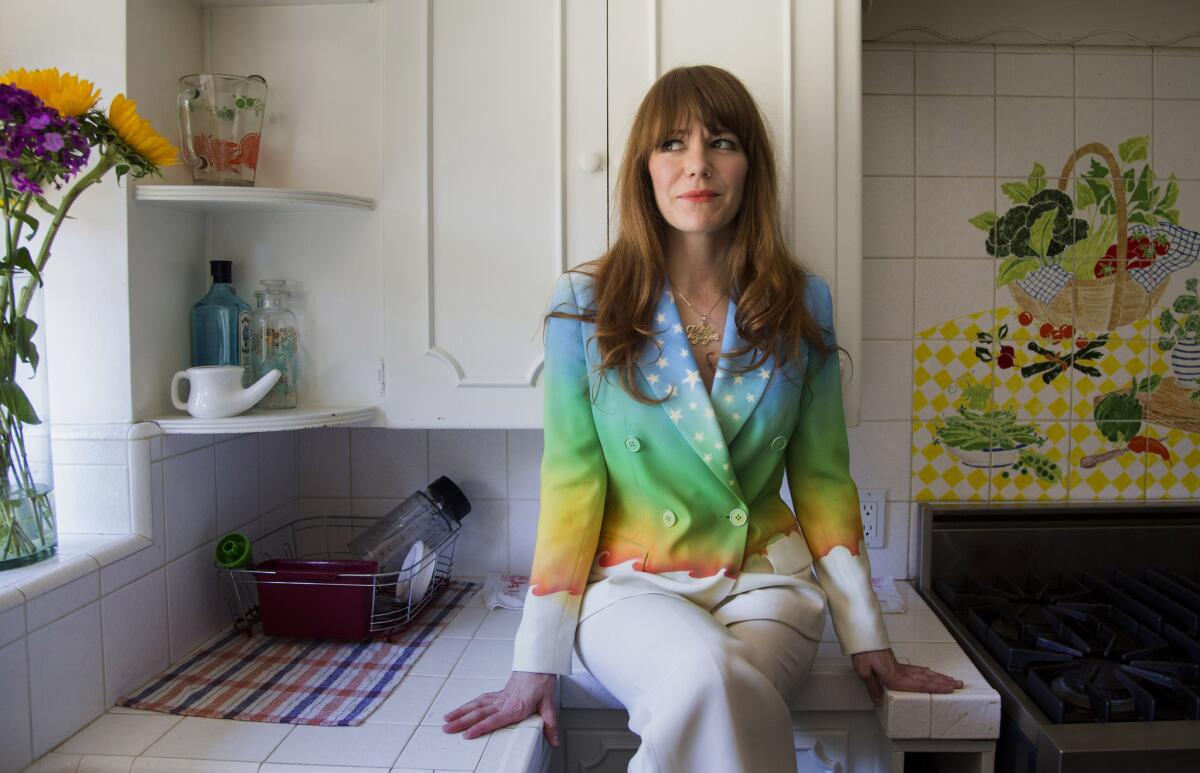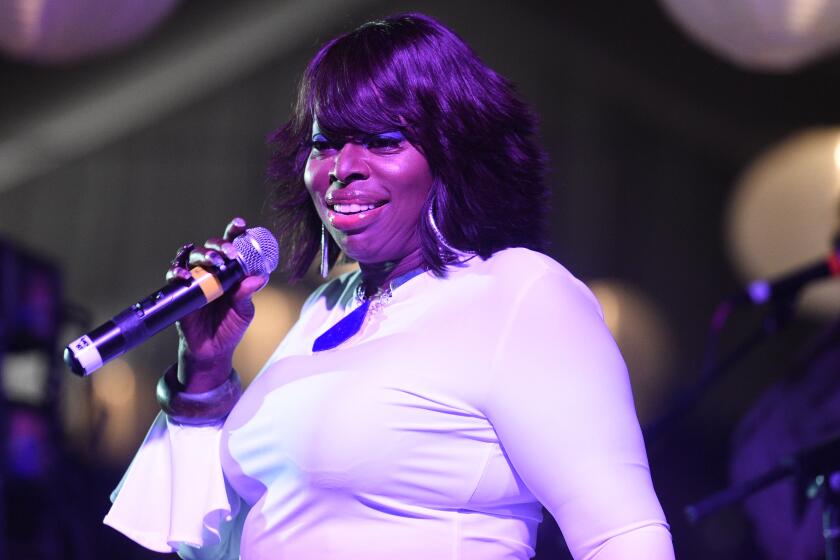Jenny Lewis on ‘Rabbit Fur Coat’: ‘It was the first time for everything’

Jenny Lewis at home in Los Angeles in 2014. The singer-songwriter is on tour celebrating the 10th anniversary of her debut solo album, “Rabbit Fur Coat.”
- Share via
In 2005, Conor Oberst asked Jenny Lewis if she might be interested in making a solo album for his fledgling record label, Team Love.
Her reaction wasn’t quite what the Bright Eyes frontman was expecting.
“I was like, “‘Are you crazy? I can’t make a record on my own!’” recalled Lewis, then known as the singer in the Los Angeles indie-rock group Rilo Kiley. “My identity was wrapped up in my band. I never envisioned myself as a solo artist.”
See more of Entertainment’s top stories on Facebook >>
Yet a solo artist is just what Lewis became with the rootsy “Rabbit Fur Coat,” which came out in January 2006 and -- with closely observed tunes about love, religion and her complicated childhood -- opened a new chapter for one of pop music’s smartest, funniest songwriters.
Since then, Lewis (who began her show-business career as a child actor in 1980s movies like “Troop Beverly Hills”) has released a string of acclaimed albums, including 2014’s “The Voyager.” She’s also recorded with Elvis Costello and Brandon Flowers and toured as a member of the Postal Service.
Now she’s celebrating the 10th anniversary of “Rabbit Fur Coat” with a brief tour on which she’s playing the album in its entirety with help from M. Ward and the Watson Twins, who appeared on the original album.
I spoke with Lewis this week before the tour launches Thursday with a three-night stand at Immanuel Presbyterian Church on Wilshire Boulevard. Here are excerpts from our conversation.
Lots of bands hit the road these days to perform old records. Do you go in for that retrospective vibe?
I don’t tend to look back in my life, which is probably why I’ve found myself in some pretty weird situations. But I think touring with the Postal Service a couple of years ago changed my perspective on that; it showed me how important it is to reflect, to kind of assess the songs from your life.
What did you find when you assessed the songs from “Rabbit Fur Coat”?
They’re strangely relevant now. And that doesn’t always happen. There are some Rilo Kiley songs that I’ve tried to put in my more recent touring sets, and they just don’t feel like me anymore. But with these songs, they’re like predictors of the future; they’re little psychic bursts. When I’m writing songs, sometimes I don’t understand what I’m writing about, and it kind of takes me a decade to figure it out.
Part of what distinguished “The Voyager” was its clear-eyed quality. The debut feels different.
It feels wordier. I think I was in a place where I was listening to so many of Conor’s songs, and I was so entrenched in his world that I didn’t really edit a lot of the lyrics. I’ve become a more thorough editor of my own words. But back then I had no expectations, and these were just songs that I wrote in my bedroom. I kind of barfed out the lyrics and committed them to tape.
It’s more innocent.
There’s something really pure about it. No one was watching me; no one knew about it. No one was even really calling me a songwriter at that point. I was in a band, and although I was writing those songs -- by myself and with Blake [Sennett, of Rilo Kiley] -- it’s just different when you’re creating in a vacuum. And then people start talking about your music, and you start, unfortunately, taking that in when you’re writing. You can’t help it.
What do you remember about the shows you played at the time?
It was the first time for everything. It was the first time I ever stood on a stage without Blake. It was the first time I was collaborating with women. It was the first time I took on all these things that in the past I had shared with my band: merch and videos and pictures and all of this stuff. I was becoming this fully formed artist, and I didn’t even know it.
You went on working with women in your live bands. Was it important to you to continue that?
Oh, absolutely. It’s just a different dynamic when women are playing together in a room. The moment I started singing with the twins, I knew it was meant to be. It really reminded me of when I started singing as a child with my mother and my sister in the San Fernando Valley. That’s when I discovered music. And working with women has led to some of the most satisfying moments of my musical life. Some of the most difficult, too, because my relationship with my mother is a difficult one. But it’s almost karmic that I reach out to women in my work.
The arrangements on “Rabbit Fur Coat” are pretty sparse compared with the last couple of Rilo Kiley albums.
That was definitely a choice I made. If you think about it, in Rilo Kiley I was the lyricist -- and a songwriter, with Blake. But the lyrics were mine. Blake’s role was producer, and his job was to fill out the instrumentation and arrange the songs. So there’s a lot of that there. But when you take all of that away, it’s just the songs. With “Rabbit Fur Coat,” I wanted to strip it back to the bare essentials, so you could really hear the stories.
One of the songs on the album that attracted the most attention was a rendition of “Handle With Care” by the Traveling Wilburys, which you did with vocals from Oberst, M. Ward and Ben Gibbard. People thought it was kind of a wacky choice.
I know, and it’s so funny, because I chose it because of the lyric. I mean, straight up, it couldn’t have been more perfect for the story of my life. “Sent to meetings, hypnotized / Overexposed, commercialized”? That’s like my whole childhood. So it was truly just a stoner idea: I love this song. George Harrison is my favorite Beatle. I’m gonna ask my friends to sing the parts.
Since then you’ve become known as a great classic-rock appreciator with very warm things to say about bands such as Fleetwood Mac and the Eagles. Was Glenn Frey’s death a shock, especially coming right after David Bowie died?
Glenn Frey is my David Bowie. And I love David Bowie. We shared the same birthday, so I’ve been thinking about him since I was 4 years old. But for the way I grew up, in the Valley with my mother’s record collection -- the Eagles songs, I know them all by heart. And that music has informed my music throughout the years. I was pretty devastated.
Among hip young musicians, the Eagles haven’t quite been reappraised in recent years the way Fleetwood Mac has. Are the Eagles big in your circle?
I don’t know if my friends would admit that they love the Eagles. But they do. Did the Eagles become less cool after “The Big Lebowski”? Was that the moment?
I think it was a moment.
I wonder if that reflects how the Coen brothers feel, or just how they imagined the Dude felt. I wonder if the Coen brothers actually like the Eagles? I bet they do.
One last thing. I read that you popped out to play a song with Jimmy Buffett during his show in Brooklyn on New Year’s Eve. That blew my mind a little bit.
Well, I’m writing -- this is the first time I’m saying this out loud -- I’m writing some songs for a “Margaritaville” musical with Jimmy, who’s a friend of mine. I can’t really say too much about it, but I can tell you because he announced it onstage at Barclays Center that night after Huey Lewis played. It was one of the most surreal nights of my life.
You know, the question of whether you’re related to Huey Lewis never entered my mind until right now.
I met him in the hallway and made a joke. I was like, “Dad, is that you?”
Twitter: @mikaelwood
MORE
Rihanna’s ‘Anti’ hits 1 million downloads in 14 hours; physical release to come
Review: Sia wastes an opportunity on the ordinary ‘This Is Acting’
‘Why the Mountains Are Black’ aims to show music as a ‘tool for survival’
More to Read
The biggest entertainment stories
Get our big stories about Hollywood, film, television, music, arts, culture and more right in your inbox as soon as they publish.
You may occasionally receive promotional content from the Los Angeles Times.








